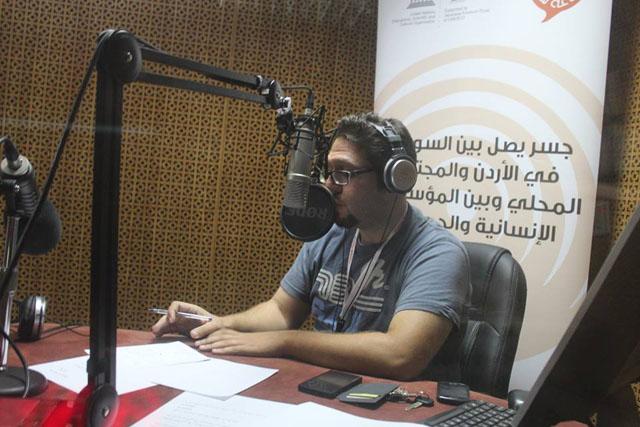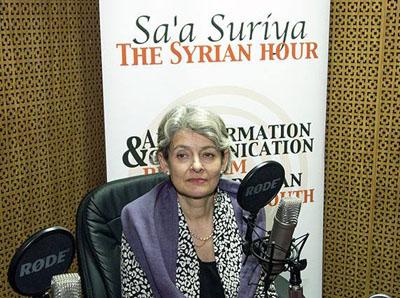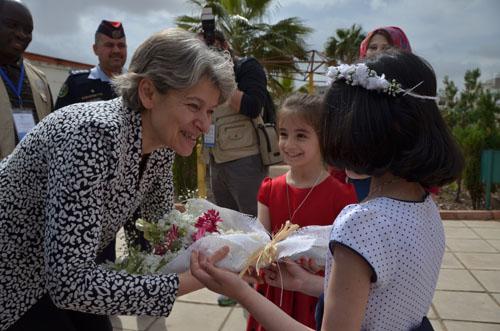You are here
A ‘Syrian hour’ brings Jordanians, refugee community together on the radio
By Sascha Luebbe - Feb 19,2015 - Last updated at Feb 19,2015

AMMAN — A radio show initially conceived to benefit Syrian refugees living among host communities has also become a tool enabling Jordanians to know more about Syrians’ plight and interact with them.
Sarah Dabbakeh, who has just received a university degree in journalism, did not know anything about the situation of Syrian refugees, until six months ago when she joined the team of Saa Suriya (The Syrian Hour) on Farah Al Nas (98.5FM).
“That’s why the project interested me,” the 21-year-old said.
Dabbakeh is among a team of 20 young Jordanian journalists regularly working from the field within refugee communities to produce stories of human interest for Saa Suriya.
In her features, the young journalist primarily looks at the situation of Syrian women and children.
At first, the refugees were aloof, she said, but by now, most of them have come to trust the team.
Dabbakeh described the feedback on the broadcast as “consistently positive” both among Syrians and Jordanians.
“Many refugees recognise themselves in the stories,” she noted, “while there are many Jordanians who would like to help, but don’t know how. We give them ideas.”
Saa Suriya was first launched by UNESCO in 2012 on Yarmouk FM (105.7FM), which broadcasts to Irbid and Mafraq in the north to provide information about issues and services related to refugees in the Kingdom, but the broadcast only lasted for three months.
During the six-month pilot phase, which included three months of preparation, the project was funded by the Swedish government.
In 2013, with support from the Japanese government, the broadcast was extended for another year. At present, Saa Suriya is undergoing an evaluation phase. If successful, it will soon be back on the airwaves.
In March 2014, the show was also launched on the Jordanian Hashemite Fund for Human Development’s Farah Al Nas community radio station, which is based in Amman.
Saa Suriya is implemented in cooperation with Italian NGO Un ponte per.
“When the first Syrian refugees arrived in Jordan, there were hardly any reliable information platforms,” Wencke Müller, from UNESCO’s division of communication and information, which developed the project, told The Jordan Times.
“There were lots of rumours, but little direct dialogue between the NGOs and the refugee communities.”
Finding accommodation and supplies for the refugees was the top priority at the time; media and communication were of secondary importance, Müller, the programme coordinator, explained. This is exactly what the programme addressed.
She sees Saa Suriya as “a bridge between the refugees, the host community and the local organisations”.
“Everyone in Jordan talks about the Syrians. But we wanted to reveal the humanitarian aspect of the situation,” said Mohammad Massad, who presents the show on Farah Al Nas.
“There are always two broadcasts per week, one on Sunday and one on Tuesday,” explained Massad, who is presently completing his journalism degree.
“Each show is dedicated to a certain topic, which we illuminate in features and discussions with studio guests,” the 28-year-old told The Jordan Times.
The show’s teams on both radio stations mostly invite representatives of international organisations to explain, for instance, what services the refugees can take advantage of.
According to UN figures, there are roughly 620,000 registered Syrian refugees in Jordan. Over 80 per cent of them live outside official camps.
The project has been met with a positive response outside the country. The BBC has already reported on Saa Suriya. Last Friday, the show’s team broadcast live from UNESCO headquarters in Paris on World Radio Day.
For Müller, it is also the medium that makes the format so popular.
“Radio is more suitable than television or newspapers for reaching people in crisis,” she said.
“UNESCO used it many times in the past, for example in Haiti.”
The team had 4,000 solar and hand-crank-operated pocket radios produced just for the project so that its members were able to reach households that could not afford their own radios or were cut off from the power supply.
The story was done as part of the Goethe Institute's journalistic exchange project "Close-Up"
Related Articles
Syrian refugees can learn more about the services they are entitled to in Jordan and other issues of interest to them thanks to a radio show launched by UNESCO.
Tackling the problem of Syrian refugees in isolation from the development issues of host countries is not a good strategy, according to UNESCO Director General Irina Bokova.
AMMAN — The efforts of local community radio station Farah Al Nas in tackling political, social and developmental issues related to youth an














